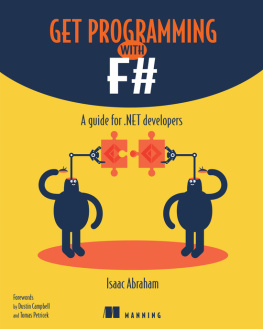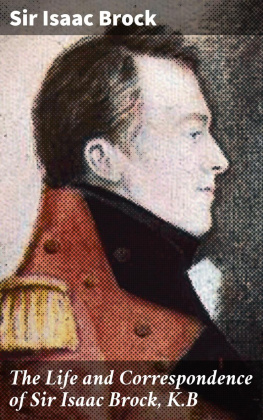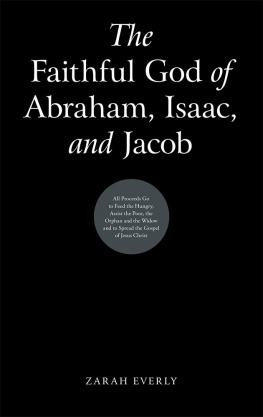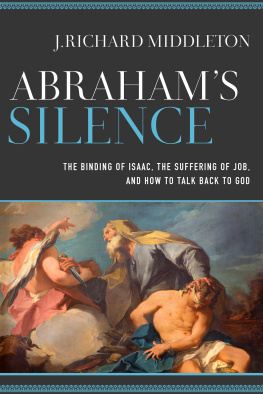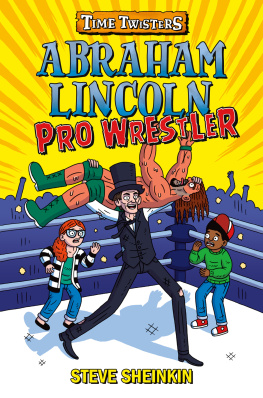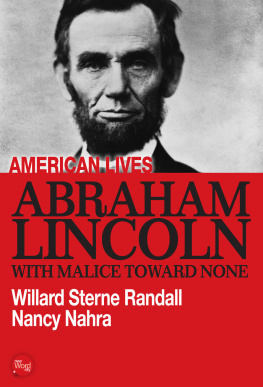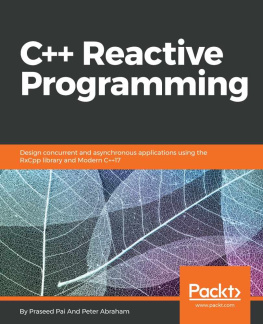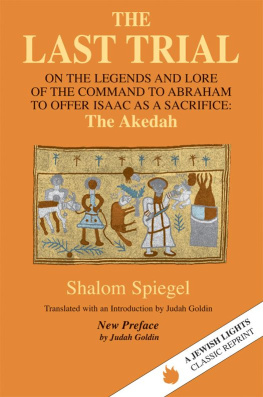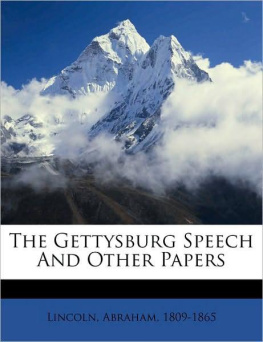Isaac Abraham - Get Programming With F#
Here you can read online Isaac Abraham - Get Programming With F# full text of the book (entire story) in english for free. Download pdf and epub, get meaning, cover and reviews about this ebook. year: 0, genre: Home and family. Description of the work, (preface) as well as reviews are available. Best literature library LitArk.com created for fans of good reading and offers a wide selection of genres:
Romance novel
Science fiction
Adventure
Detective
Science
History
Home and family
Prose
Art
Politics
Computer
Non-fiction
Religion
Business
Children
Humor
Choose a favorite category and find really read worthwhile books. Enjoy immersion in the world of imagination, feel the emotions of the characters or learn something new for yourself, make an fascinating discovery.
- Book:Get Programming With F#
- Author:
- Genre:
- Year:0
- Rating:5 / 5
- Favourites:Add to favourites
- Your mark:
- 100
- 1
- 2
- 3
- 4
- 5
Get Programming With F#: summary, description and annotation
We offer to read an annotation, description, summary or preface (depends on what the author of the book "Get Programming With F#" wrote himself). If you haven't found the necessary information about the book — write in the comments, we will try to find it.
Get Programming With F# — read online for free the complete book (whole text) full work
Below is the text of the book, divided by pages. System saving the place of the last page read, allows you to conveniently read the book "Get Programming With F#" online for free, without having to search again every time where you left off. Put a bookmark, and you can go to the page where you finished reading at any time.
Font size:
Interval:
Bookmark:

For online information and ordering of this and other Manning books, please visit www.manning.com. The publisher offers discounts on this book when ordered in quantity. For more information, please contact
Special Sales Department Manning Publications Co. 20 Baldwin Road PO Box 761 Shelter Island, NY 11964 Email: orders@manning.com2018 by Manning Publications Co. All rights reserved.
No part of this publication may be reproduced, stored in a retrieval system, or transmitted, in any form or by means electronic, mechanical, photocopying, or otherwise, without prior written permission of the publisher.
Many of the designations used by manufacturers and sellers to distinguish their products are claimed as trademarks. Where those designations appear in the book, and Manning Publications was aware of a trademark claim, the designations have been printed in initial caps or all caps.
 Recognizing the importance of preserving what has been written, it is Mannings policy to have the books we publish printed on acid-free paper, and we exert our best efforts to that end. Recognizing also our responsibility to conserve the resources of our planet, Manning books are printed on paper that is at least 15 percent recycled and processed without the use of elemental chlorine.
Recognizing the importance of preserving what has been written, it is Mannings policy to have the books we publish printed on acid-free paper, and we exert our best efforts to that end. Recognizing also our responsibility to conserve the resources of our planet, Manning books are printed on paper that is at least 15 percent recycled and processed without the use of elemental chlorine.
 | Manning Publications Co.20 Baldwin RoadPO Box 761Shelter Island, NY 11964 |
ISBN 9781617293993
Printed in the United States of America
1 2 3 4 5 6 7 8 9 10 EBM 23 22 21 20 19 18
When I first met Isaac Abraham in 2015, I knew immediately that he shared my passion for educating .NET developers in the art of F#. His book, which you hold in your hands, is the text I had wanted when I first kindled my F# romance. Inside, Isaac will lead you on a journey of F# thats both pragmatic and relevant. If youre a C# or Visual Basic .NET developer, youll learn through a series of lessons how to apply F# to everyday .NET development. You wont have to wade through the deep theoretical explanations that are often the staple of functional programming books. Instead, Isaac will guide you with practical advice and best practices derived from his own experience as an F# developer.
I first fell in love with F# when it was still a research language being developed out of Microsoft Research in Cambridge, England. The language was a bit rough around the edges, but every monthly release brought a fresh set of exciting new features to explore. The community was small but already vibrant, eager to evangelize any who would listen about how F# was so expressive, powerful, and fun. I found myself caught up in it all.
Since F# was still very new, there werent many books available to help me learn the language. Being a self-taught C# programmer, I wanted something that was light on theory and heavy on practice, but such books hadnt been written yet. I even made my own meager attempt to fill that void, by writing a blog series (viewable today only via the Internet Archive) titled, Why I Love F#.
In each blog article, I attempted to present F# to everyday C# developers like myself, highlighting features that marry well with .NET development such as the F# Interactive environment, type-safe format strings, tuples, and pattern matching. I wanted to encourage others to explore this beautiful language that Id become quite smitten with, and to teach them how to use it effectively to create .NET programs. Eventually, my blog fell by the wayside. After joining the .NET languages team at Microsoft, I could no longer find the time to keep it current and gave it up.
Fast-forward to today. Today, F# is more popular than ever and growing at a rapid pace. F# code is running quite literally everywhere: on desktops, mobile devices, the web, IoT devices, and in the cloud. F# has reached its fourth major version, boasts an active and fiercely passionate community, and enjoys first-class tooling support in many IDEs and editors, such as Visual Studio, Visual Studio for Mac, and JetBrains Rider. And of course, F# books are available on a wide variety of topics, from the more general purpose to fully scientific.
F# exemplifies an aspect of programming that all too often is forgotten: programming should be fun. With Isaac as your teacher, Im confident youll have an absolute blast.
D USTIN C AMPBELL P RINCIPAL S OFTWARE E NGINEER , .NET L ANGUAGES T EAM , M ICROSOFT
In the Introduction to F#, Isaac mentions that F# leads you to a pit of success, which is something that I wholeheartedly agree with. I believe that the way this happens has a lot to do with how a pragmatic way of thinking, functional ideas, and a powerful runtime come together in F#. The functional ideas serve as a fantastic tool for understanding and modeling the problem domain in a simple way. At the same time, F# gives you a versatile toolbox for solving concrete problems within the domain. This includes a language that supports multiple paradigms including functional, object-oriented, and imperative, but also powerful .NET and F# libraries. Again, this book introduces F# from exactly the right perspective. It rightly puts a strong emphasis on thinking about the domain in a functional way, but at the same time, it introduces all of the important tools from the F# toolbox.
When I started learning the F# language 10 years ago, the typical advice was that F# is just a functional programming language for .NET, so you should forget everything you know about programming, read a couple of academic functional programming textbooks, and then figure out how to use the functional concepts to write .NET applications on your own.
Im happy that this isnt the advice we give to people who are curious about F# these days. There are two main reasons for this. First, it turns out that forgetting everything is just a poor strategy for learning F# if you have existing programming knowledge. Second, it also turns out that the functional programming label is only partly appropriate for the kind of code you write when using F# to solve real-world problems. This book reflects both points, which is what makes it a fantastic material for learning F#.
The difference between F# and other .NET languages is equally easy to overstate and to understate. On one hand, many functional language constructs now exist in C# and VB .NET, so you might think that the difference isnt that big. On the other hand, F# is rooted in functional programming and leads you to different way of thinking about problems, so you might think that you need to start from a clean slate. As is often the case, the truth is somewhere in the middle. When using F#, youll find yourself designing software differently and, as a result, falling into the pit of success described in unit 5. At the same time, learning F# shouldnt be as daunting as it was 10 years ago. Youll find many similarities to what you know already, and this book does a great job of using them to explain F# clearly and effectively.
If youre a C# or VB .NET developer who cares about solving problems in a pragmatic way, this is the book for you. Theres no need to wait for the right problem that will be well suited to functional programming and give you an excuse to learn F#. As this book clearly explains, the point of F# isnt just in functional programming, but in the pit of success, where the F# way of solving problems leads you.
Font size:
Interval:
Bookmark:
Similar books «Get Programming With F#»
Look at similar books to Get Programming With F#. We have selected literature similar in name and meaning in the hope of providing readers with more options to find new, interesting, not yet read works.
Discussion, reviews of the book Get Programming With F# and just readers' own opinions. Leave your comments, write what you think about the work, its meaning or the main characters. Specify what exactly you liked and what you didn't like, and why you think so.

